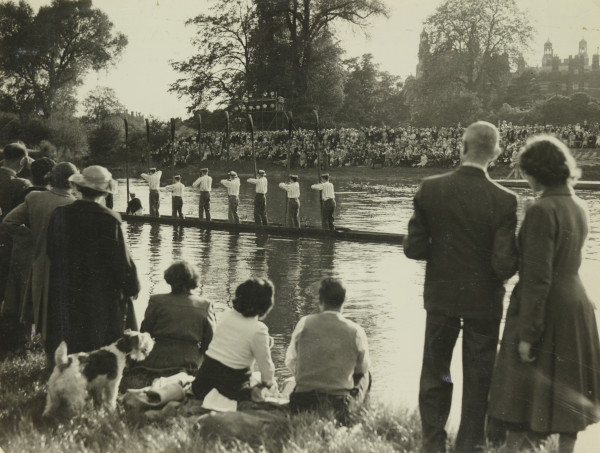In these strange times we have been looking for new ways to ‘gather’ friends together, and it has highlighted the human urge to keep in contact with others, something with many more possibilities now, than there would have been a decade or two ago.

Image from ‘Moelwyn Merchant, Fragments of a Life’ (Llandysul: Gomer, 1990) [Lo.1.23]
In 1992, when the world wide web was still in its infancy, Moelwyn Merchant’s friends all combined to create a festschrift to mark Merchant’s 80th birthday. A festschrift is a collection of writings published in honour of a scholar, a very pre-digital way of bringing friends together. Entitled A Gathering of Friends for Moelwyn, the project was organised by two of his close friends, Eluned Brown (known as Lynne) and Terrance Hawkes.

William Moelwyn Merchant (1913-1997) was a priest, academic, sculptor, poet and novelist. In the course of his life, he became acquainted, and often close friends, with various notable and high-profile individuals. In his autobiography, Fragments of a Life, Merchant claimed ‘to have been in the wings when important matters were performed on stage – and sometimes to have been accorded a small speaking part’. This modest assertion hides Merchant’s own highly accomplished achievements. However it does highlight a unique and remarkable aspect of the Moelwyn Merchant archive, which not only includes Merchant’s own papers and writings, but an important and extensive collection of the letters and manuscripts of his many friends.

These friends included Ted Hughes, R. S. Thomas, Christopher Fry, Peter Parker, Edith Pargeter (who is better known as Ellis Peters), John Piper, Benjamin Britten, Ezra Pound, and many others, many of whom were more than willing to contribute to the festschrift in Merchant’s honour. The result, which epitomises the archive, is a volume of drawings, poems, reminiscences, writings and music scores reflecting not only the high esteem Merchant’s friends held him in, but the skill and talent of so many individuals of the twentieth century.
The William Moelwyn Merchant archive was presented to Eton College by him in 1988, in honour of his fondness and his increasingly close association with the school and College Library. He continued to add to the collection until his death in 1997, when the family added further papers.
By Ceri Sugg, Project Archivist



